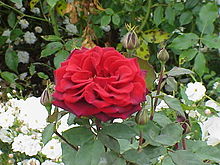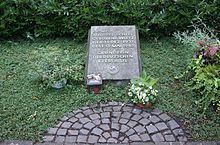Mildred Scheel
Mildred Anna Maria Therese Scheel (born December 31, 1931 as Mildred Wirtz in Cologne ; † May 13, 1985 ibid) was a German doctor and founder of the German Cancer Aid . Through her social and charitable commitment during the time as the wife of the Federal President of the Federal Republic of Germany , Walter Scheel , she became one of the most famous German women of the post-war period and enjoyed a high international reputation.
Live and act
Mildred Scheel was the third child of X-ray doctor Hubert Wirtz and his American wife Anna Elsie Wirtz, née Brown. Even as a child she was very interested in medicine and often accompanied her father to his practice. The family left the bombed-out Cologne in 1944 and went to Amberg .
After graduating from high school in Amberg in 1950 , she studied medicine in Munich , Innsbruck and Regensburg . She passed her state examination in Munich and then took up a position as a medical assistant specializing in radiology . She then worked in various hospitals and as a representative in medical practices. In 1963 their daughter Cornelia was born, who emerged from a relationship with the film director Robert Adolf Stemmle and whom she initially raised alone.
In 1967 Mildred Scheel met her future husband, the Solingen FDP politician Walter Scheel , in a sanatorium where she was working at the time . Here he was recovering from a kidney operation. On July 18, 1969, the two married in Munich- Schwabing and soon afterwards moved to Bonn - Walter Scheel became Foreign Minister of the Federal Republic of Germany in October of the same year . The couple had a daughter and adopted the orphan Simon-Martin from Bolivia .
Public life
With the election of Walter Scheel as Federal President on May 15, 1974, Mildred Scheel's public life began with tasks and duties. In keeping with the tradition of Elly Heuss-Knapp and Wilhelmine Lübke , the doctor Mildred Scheel chose a social and health-political task: fighting cancer. "This can only succeed all the better if all citizens show solidarity," said Scheel when she announced her plan. On September 25, 1974, she founded the German Cancer Aid. She was very committed to cancer aid: even on state visits, she collected donations for the association.
The life's work
With the founding of the German Cancer Aid in 1974, the foundation stone was laid for Mildred Scheel's charitable life's work. From the start, your organization was distinguished by the fact that no tax money was expected and no donations from the pharmaceutical industry were accepted. “We have to be absolutely independent of politics and economic interests, but only remain committed to people and their health,” was one of the credo.
Mildred Scheel broke the taboo to speak openly and freely about cancer in general and about abdominal and prostate cancer in particular.
Shortly after it was founded, Mildred Scheel succeeded in winning the medical profession over to work together. She initiated the first scientific medical conferences with cancer experts from Europe, the USA and Asia.
Ten years after the founding of Deutsche Krebshilfe, Mildred Scheel was diagnosed with colon cancer herself, from which she died in 1985. That honor grave Mildred Scheel is on the old cemetery in Bonn .
Object of artistic interest
Mildred Scheel became an object of artistic expression.
- Andy Warhol created a color serigraph with her portrait .
- The sculptor Kurt Arentz designed a bronze bust (Deutsche Krebshilfe Collection, Bonn).
- Hermann Schardt , professor at the Folkwangschule Essen , designed a medal with the portrait of Mildred Scheel.
- Sabina Grzimek created the bronze plastic sculpture of Dr. Mildred Scheel for the National Center for Tumor Diseases ( NCT ) Heidelberg (height 2.40 m; set up on May 12, 2010)
honors and awards

Mildred Scheel's honors include over 20 state medals. In 1976 she received the German Bambi Media Prize . In 1977, 1978 and 1979 she was voted woman of the year . The Mildred-Scheel-Haus and Mildred-Scheel-Strasse in Dresden were named after her. There is also a Mildred-Scheel-Strasse in Bonn. A vocational school in Solingen , a vocational school in Böblingen and a secondary school in Neuss were also named after her. The University of Maryland awarded her an honorary doctorate in 1980 .
A rose variety was named after Mildred Scheel in 1976.
Legacy and Success
Mildred Scheel built up the German Cancer Aid with the help of private donors. Since then, various institutions have been associated with her name. These include the Mildred Scheel Foundation for Cancer Research (Bonn 1976), the internationally active Mildred Scheel Cancer Conference (1977) and the Mildred Scheel Kreis e. V. (Bonn 1977). Cornelia Scheel has been chairing the friends' association since December 2017 .
In 1983, the Deutsche Krebshilfe founded Germany's first palliative ward with the Clinic for Surgery at the University Clinic in Cologne. This was followed in 1992 by the Dr. Mildred Scheel-Haus and in 1993 the Dr. Mildred Scheel Academy for Research and Education in Cologne.
Since 2013 the Mildred-Scheel-Akademie Göttingen (one of five academies for palliative medicine in Germany funded by donations from the German Cancer Aid) has been offering training opportunities through qualified speakers.
On the 40th anniversary of the founding of the German Cancer Aid, Cancer Aid President Fritz Pleitgen paid tribute to Mildred Scheel's achievements in Berlin.
Date of birth 1931 or 1932?

The majority of publications give 1932 as the year of her birth. The correct information on her tombstone is “DR · MED · / MILDRED SCHEEL / GEBORENE WIRTZ / GEB · 31 · DEC · 1931 / […]”. Her daughter Cornelia Scheel explained the confusion with an error on the part of the registrar due to the turn of the year when registering the birth at the beginning of January 1932. This error was only noticed by an official after the census of May 27, 1970: “He found out that the birth document, provided with the date of issue 04.01.1932, could not possibly record the birth of 31.12.1932. [...] “The registrar made a mistake when registering the birth and entered the new year 1932 instead of 1931. “From then on this date was found on all papers and documents, and my mother saw no reason to doubt it. [...] So my mother was sure until the summer of 1970 that she was thirty-seven at that time, and she did the devil to correct that now. "
Posthumous appreciation
In 2008 the city of Munich posthumously honored Scheel by naming a street in Schwabing- West in Mildred-Scheel-Bogen (city council resolution of February 14, 2008). It is also a reminder that the doctor studied, lived and worked in the Bavarian capital for many years.
literature
- Cornelia Scheel : Mildred Scheel: Memories of my mother. Rowohlt, Reinbek 2015, ISBN 978-3-498-06087-9 .
- Heike Specht: “Your side of the story. Germany and its First Ladies from 1949 until today ”, Piper-Verlag, Munich 2019. ISBN 978-3-492-05819-3 .
Web links
- Literature by and about Mildred Scheel in the catalog of the German National Library
- Short biography of Mildred Scheel on krebshilfe.de
- Obituary in DER SPIEGEL 21/1985
- ZeitZeichen : May 13th, 1985 - anniversary of the death of the doctor Mildred Scheel
Individual evidence
- ↑ Curriculum vitae in the information brochure of the German Cancer Aid ( Memento of the original from March 4, 2016 in the Internet Archive ) Info: The archive link was inserted automatically and has not yet been checked. Please check the original and archive link according to the instructions and then remove this notice.
- ↑ Cornelia Scheel: Mildred Scheel: Memories of my mother. Rowohlt, Reinbek 2015, ISBN 978-3-498-06087-9
- ↑ Petra Pluwatsch: Cornelia Scheel puts a monument to her mother. In: Kölner Stadt-Anzeiger from October 26, 2015 (accessed October 28, 2015).
- ↑ Cornelia Scheel is a future colleague . December 19, 2017 ( krebshilfe.de [accessed January 5, 2018]).
- ↑ Our palliative center . Website of the University Clinic Cologne, accessed on December 27, 2013.
- ↑ Dr. Mildred Scheel Academy - the advanced training center of the German Cancer Aid . German Cancer Aid V, accessed December 27, 2013.
- ^ Friedemann Nauck, University Medicine Göttingen, June 4, 2013.
- ↑ Raise the curtain for life - 40 years of German Cancer Aid , press release of the German Cancer Aid from July 8, 2014
- ↑ Cornelia Scheel: Mildred Scheel: Memories of my mother. Rowohlt, Reinbek 2015, ISBN 978-3-498-06087-9
| personal data | |
|---|---|
| SURNAME | Scheel, Mildred |
| ALTERNATIVE NAMES | Wirtz, Mildred (maiden name) |
| BRIEF DESCRIPTION | German doctor, wife of Walter Scheel, founder of the German Cancer Aid |
| DATE OF BIRTH | December 31, 1931 |
| PLACE OF BIRTH | Cologne |
| DATE OF DEATH | May 13, 1985 |
| Place of death | Cologne |

